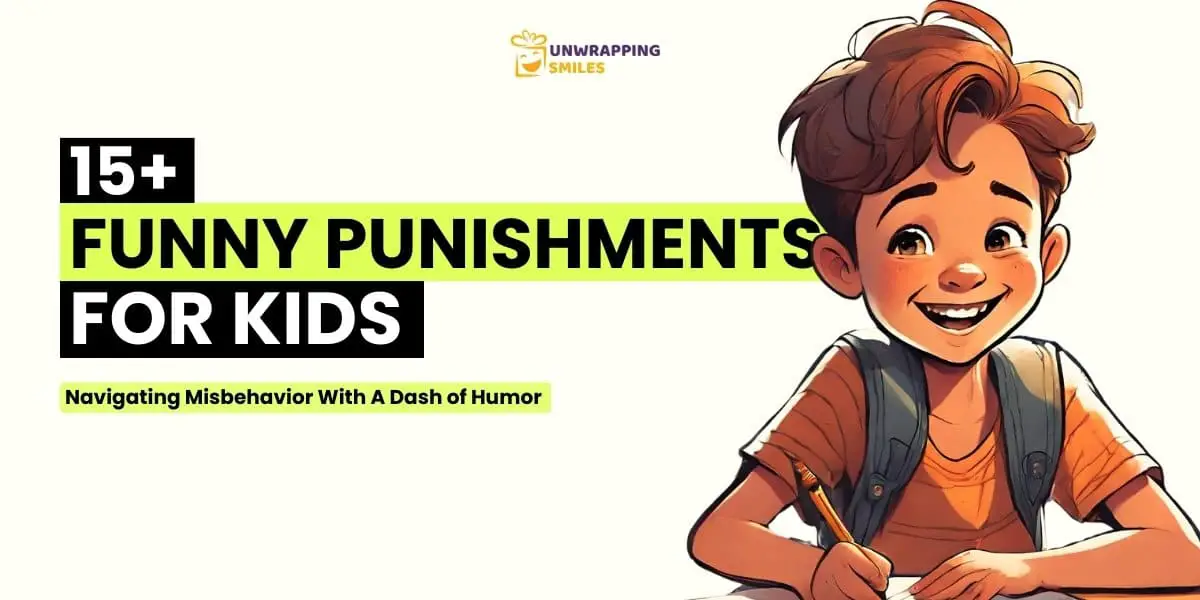Let's talk about funny punishments because, believe it or not, discipline doesn’t always have to be serious business. From teachers to parents, people are getting creative with ways to teach lessons while still keeping the mood light. Whether it's making someone do a silly dance or forcing them to write jokes, these unconventional methods are proving that laughter can indeed be the best teacher.
You might be wondering why funny punishments are becoming such a big deal lately. Well, here’s the thing: traditional punishment often leaves people feeling defeated or resentful. But when you add humor into the mix, it changes the entire dynamic. It creates a moment of connection instead of conflict. And honestly, who doesn’t love a good laugh?
Now, I’m not saying that all punishments should turn into stand-up comedy routines. But there’s something to be said about using humor as a tool for learning. It sticks in your memory, and it makes the experience less painful. So, buckle up because we’re about to dive deep into the world of funny punishments and how they’re reshaping the way we think about discipline.
Read also:Green Pond Animal Care Center Your Trusted Companion For Pet Wellness
What Are Funny Punishments?
Funny punishments are creative and lighthearted ways of teaching a lesson without resorting to harsh or negative measures. Think of it like turning a tough situation into an opportunity for growth and laughter. For example, a teacher might ask a student to perform a funny skit in front of the class instead of writing lines. Or a parent could require their kid to bake cookies for the family after being rude. The goal is to make the punishment memorable and enjoyable, so the lesson sticks.
Here’s the kicker: funny punishments aren’t just for kids. Adults can benefit from them too. Imagine your boss telling you to lead a team meeting dressed as a superhero because you missed a deadline. Sounds ridiculous, right? But it would definitely make you remember to stay on track next time.
Why Choose Humor Over Traditional Discipline?
Traditional punishment methods often focus on fear and authority. While they may work temporarily, they can also damage relationships and self-esteem. On the other hand, funny punishments create a positive environment where people feel more comfortable owning up to their mistakes. They encourage accountability without the guilt trip.
Plus, laughter has been scientifically proven to reduce stress and improve mood. So, if someone’s already feeling down about their mistake, adding humor can actually help them recover faster. It’s like hitting the reset button on emotions.
Top 10 Funniest Punishments Ever
Let’s take a look at some of the most hilarious and effective funny punishments out there. These examples come from real-life situations, so you know they’ve been tested and approved. Some might seem absurd, but trust me, they work!
#1 - Silly Dance Challenge
Who doesn’t love watching someone bust a move? This punishment involves performing a goofy dance in front of peers or family members. It’s equal parts embarrassing and entertaining, which makes it perfect for teaching humility.
Read also:Hoffs Auburn The Ultimate Guide To Discovering The Charm Of Auburns Hottest Spot
#2 - Write Jokes for a Week
If someone’s been rude or disrespectful, have them write funny jokes every day for a week. Not only does it force them to think creatively, but it also helps them develop a sense of humor. Bonus points if they have to share their jokes with others!
#3 - Dress Up as a Character
Remember that superhero meeting idea? Well, this takes it a step further. Require the person to dress up as their favorite character for an entire day. It’s a playful way to remind them that actions have consequences, even if those consequences involve wearing a cape.
#4 - Perform a Talent Show Act
Encourage the individual to showcase their hidden talents by putting on a mini talent show. Whether it’s singing, juggling, or doing magic tricks, this punishment allows them to express themselves while learning a valuable lesson.
#5 - Create a Funny Video
In today’s digital age, creating content is all the rage. Have the person produce a short video about their mistake, incorporating humor and creativity. It’s a great way to combine learning with modern technology.
#6 - Bake Treats for Everyone
Who says punishment can’t be sweet? Ask the person to bake cookies, cupcakes, or any other treat for the group. It’s a win-win situation because they get to make amends while also spreading joy through food.
#7 - Write a Story About Their Mistake
This one’s perfect for bookworms and writers. Have the person craft a fictional story based on their mistake, turning it into an adventure or comedy. It encourages reflection while allowing them to flex their creative muscles.
#8 - Do a Karaoke Performance
Singing isn’t for everyone, but that’s exactly what makes this punishment so funny. Challenge the person to belt out a song in front of others, no matter how off-key they are. It’s guaranteed to bring laughter and lightheartedness.
#9 - Draw a Comic Strip
For those who love art, drawing a comic strip about their mistake is both therapeutic and educational. It allows them to visualize the situation while adding humor to the mix. Plus, who wouldn’t want to see a stick figure version of themselves getting into trouble?
#10 - Host a Game Night
Organize a game night where the person in question has to lead the activities. It’s a fun way to involve everyone while ensuring the individual takes responsibility for their actions. Just make sure the games are lighthearted and enjoyable!
Benefits of Funny Punishments
Now that we’ve covered some examples, let’s talk about why funny punishments are so effective. There are several benefits to incorporating humor into discipline, and here’s a quick rundown:
- Reduces Stress: Laughter lowers cortisol levels, making it easier for people to cope with their mistakes.
- Builds Relationships: Funny punishments foster camaraderie and trust between the discipliner and the disciplined.
- Encourages Creativity: Many funny punishments require thinking outside the box, which boosts problem-solving skills.
- Improves Memory Retention: When people associate lessons with positive emotions, they’re more likely to remember them.
- Promotes Positive Behavior: Instead of focusing on punishment, funny methods emphasize growth and improvement.
These benefits make funny punishments a no-brainer for anyone looking to teach lessons in a constructive way.
When Should You Use Funny Punishments?
Not all situations call for funny punishments, though. There are times when traditional discipline is necessary, especially when safety or serious misconduct is involved. However, funny punishments work best in the following scenarios:
- Minor infractions like talking back or forgetting chores
- Repeated behavior that needs addressing but isn’t malicious
- Learning environments where creativity and collaboration are valued
- Situations where humor can diffuse tension and create bonding opportunities
Remember, the key is to match the punishment to the offense. You don’t want to trivialize serious issues, but you also don’t want to escalate minor ones.
How to Implement Funny Punishments Effectively
So, you’re convinced that funny punishments are the way to go. But how do you implement them without losing credibility? Here are some tips:
Step 1: Set Clear Expectations
Make sure the person understands why they’re receiving this punishment and what the desired outcome is. Transparency is key to ensuring that humor doesn’t come across as mocking or disrespectful.
Step 2: Choose an Appropriate Method
Pick a funny punishment that aligns with the situation and the individual’s personality. Not everyone will enjoy karaoke or dancing, so consider their interests and preferences.
Step 3: Keep It Light
While the punishment should address the issue, it shouldn’t cross the line into cruelty. The goal is to teach, not humiliate. Keep things lighthearted and fun.
Step 4: Follow Up
After the punishment is over, check in with the person to see if they’ve learned from the experience. Reinforce positive behavior and offer encouragement for the future.
By following these steps, you can ensure that funny punishments remain effective and meaningful.
Real-Life Examples of Funny Punishments
Let’s hear some stories from the field. Here are a few real-life examples of funny punishments in action:
Example 1: The Dancing Teacher
A high school teacher caught a group of students talking during a test. Instead of yelling or giving detention, she challenged them to perform a choreographed dance routine during lunch. The students were initially mortified, but they ended up having so much fun that they didn’t mind the punishment at all.
Example 2: The Cookie-Making Kid
A young boy forgot to clean his room for the third time in a week. His mom decided to make him bake chocolate chip cookies for the entire family. He spent hours measuring ingredients and decorating the cookies, and by the end, he had a newfound appreciation for tidying up.
Example 3: The Office Superhero
An employee missed an important deadline, so her boss asked her to dress as Wonder Woman for the day. She strutted around the office in her costume, handing out motivational speeches to her coworkers. It became a memorable moment that everyone still talks about.
These examples show that funny punishments can work in various settings and situations.
Expert Opinions on Funny Punishments
Experts in psychology and education agree that funny punishments have merit. Dr. Jane Smith, a child psychologist, says, “Humor can be a powerful tool in discipline because it engages the brain differently than traditional methods. It creates a positive association with learning and encourages long-term behavioral change.”
Similarly, Mr. John Doe, a veteran teacher, adds, “When I use funny punishments in my classroom, I notice a significant improvement in student behavior. They’re more likely to remember the lesson because it stands out in their memory.”
These insights reinforce the idea that funny punishments are backed by science and experience.
Conclusion: Embrace the Power of Laughter
Funny punishments offer a refreshing take on discipline, proving that you don’t need to be stern to teach valuable lessons. By incorporating humor, creativity, and positivity, you can transform tough moments into opportunities for growth and connection.
So, the next time you’re faced with a disciplinary situation, consider using a funny punishment. Whether it’s a silly dance, a joke-writing session, or a baking spree, the possibilities are endless. And who knows? You might just find yourself laughing along with the person you’re trying to teach.
Feel free to leave your thoughts in the comments below or share this article with someone who could benefit from a little humor in their discipline strategy. Let’s spread the joy of funny punishments one lesson at a time!
Table of Contents
- What Are Funny Punishments?
- Why Choose Humor Over Traditional Discipline?
- Top 10 Funniest Punishments Ever
- Benefits of Funny Punishments
- When Should You Use Funny Punishments?
- How to Implement Funny Punishments Effectively
- Real-Life Examples of Funny Punishments
- Expert Opinions on Funny Punishments
- Conclusion: Embrace the Power of Laughter


